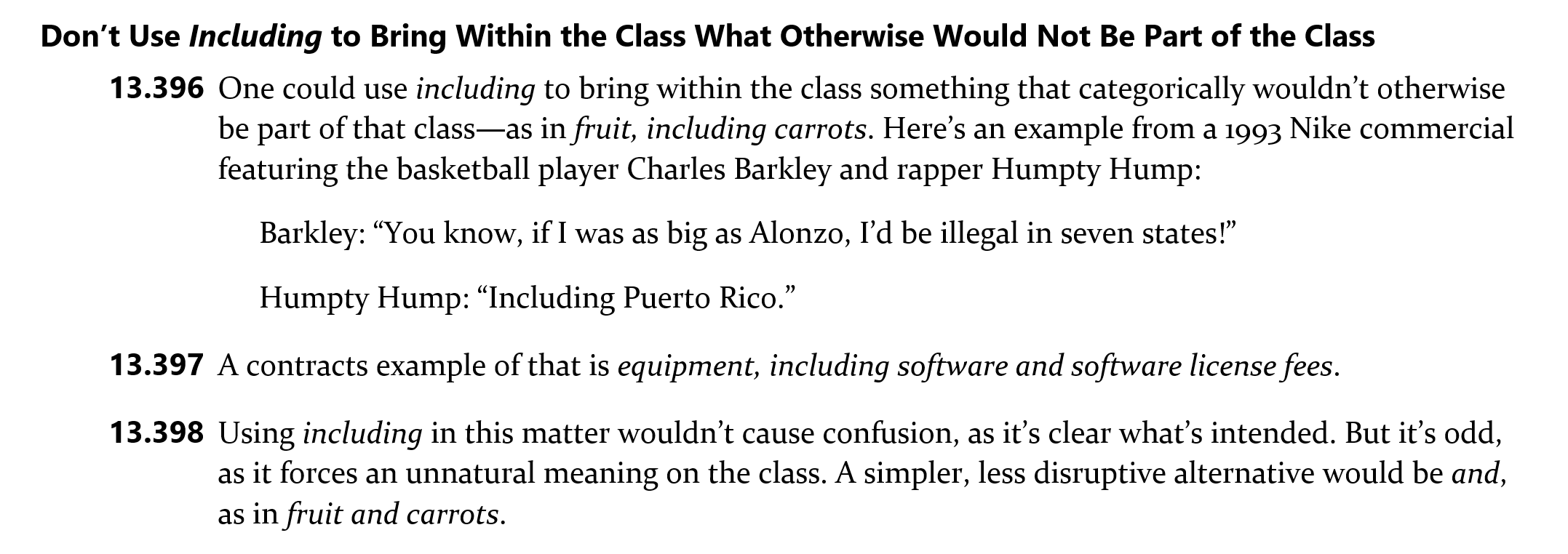One of many additions to the fifth edition of A Manual of Style for Contract Drafting is an expanded discussion of including.
“Great,” I hear you say, deadpan. “Swell.”
I assure the jaded among you that this new section is in fact particularly interesting, but that’s not what this post is about. Instead, I want to bring to your attention something lurking in this new section.
Here it is:
The Nike commercial is entirely relevant, yet gloriously obscure. It’s a gift from Gustav Schmidt, aka @gustav316 on Twitter. He told me about the commercial in a comment to a blog post, if I recall correctly. When I informed him that it will appear in the fifth edition, he said this in a Twitter DM to me:
This is possibly the greatest achievement of my life – just ahead of deriving the orbital velocity of the earth to the tenth of a nautical mile per second on the back of a napkin several weeks ago
And here’s what he said to me today:
I think that line was a somewhat comedic take on all of the sweepstakes that were being used prolifically in the 90s as a sales tactic. “Only valid in the U.S., excluding Puerto Rico” or something to that effect. Sweepstakes were rampant back then and this statement commonly accompanied them. It’s funny that unbeknownst to the Nike commercial writers, this would be a prime example of what not to do in legal drafting decades later. And in case you were wondering, the orbital velocity of the earth are pins the sun is something like 16.1 nautical miles per second, if I recall and I did actually derive that on the back of a napkin after someone asked it as a trivia question while I was riding aboard a submarine earlier this year.
Let’s just say that Gustav’s mind is, um, eclectic. It seems appropriate that after ten years as partner at the Florida law firm Gunster, Yoakley & Stewart, he’s now an “Arctic Operations Specialist (Ice Pilot).”
Note that this isn’t all for lulz. I scoured EDGAR looking for examples of this use of including, but those I found were either questionable or longwinded. The example in the commercial was exactly what I needed.
If you wish to remind yourself of, or discover, that commercial, look no further:



A few thoughts (an unappreciative interlocutor once said, ‘My God, you don’t call those ”thoughts”, do you?’):
1/ Sometimes ‘including’ is used for clarification of marginal cases, as in ‘fruit, including tomatoes’ and ‘fruit, not including tomatoes’, because tomatoes are fruit for some purposes, vegetables for others. This clarifying use seems unobjectionable to me.
2/ Bryan Garner’s advice to define ‘including’ as ‘including but not limited to’ and then use just ‘including’ has its heart in the right place but is inadequate to address the several issues around ‘including’ (some have Latin names!). MSCD addresses all the nuances.
3/ Sometimes bringing an anomalous item into the class, group, or set (‘fruit, including carrots’ or ‘fruit means fruit and carrots’) lets the drafter refer to the ‘class plus’ more concisely on subsequent references — no need to say ‘fruit and carrots’ every time: ‘fruits’ as a defined umbrella term will do. Sometimes.
4/ The ‘and’ solution is sometimes tricky. How would one best edit ‘equipment, including software and software licence fees’? Can’t say in a vacuum, but assuming that software and software licensing fees are not unambiguously within the category ‘equipment’, one could wither (a) say ‘equipment, software, and software licence fees’ every time, or (b) fall back on an explicit but counterintuitive definition: ‘equipment, software, and software licence fees (collectively, ‘equipment’)’.
5/ If one’s instant reaction to using a defined term in the definition is horror, the use is intentional, as in ‘screws’ means ‘screws, nails, screwdrivers, and hammers’.
6/ Such counterintuitive umbrella definitions can generate the need for exclusions, such as ‘screws, not including hammers’, but the need for much pulling of elements out from under the defining umbrella suggests that the umbrella definition was a bad idea, providing only false concision. –Wright